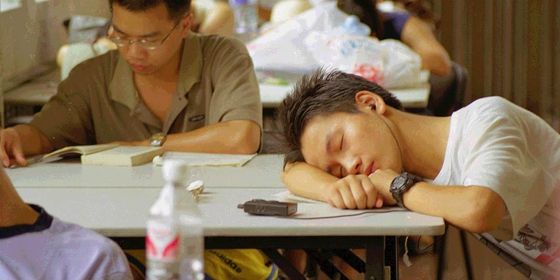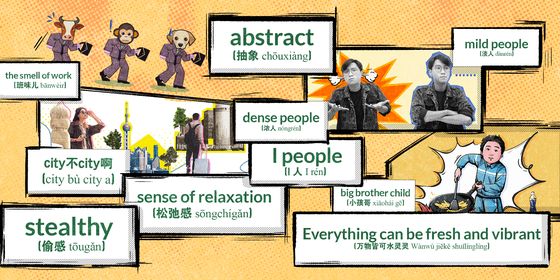Cynical sayings of depressed Chinese youths
Nothing is impossible with hard work. Dreams come true if you don’t give up. Choose courage over defeat—“inspirational” (but mostly empty) sayings like this, known as “chicken soup for the soul (心灵鸡汤 xīnlíng jītāng),” are everywhere in Chinese media, social media, and self-help books, promising to help people cope with their stressful lives in the modern world.
But some choose to deal with their problems in another, more cynical way. China’s “post-90s” and younger generations have embraced being “anti-chicken-soup (反鸡汤 fǎn jītāng),” scoffing at the hollowness of the “positive energy” attitudes of their elders, and describe themselves as sang (丧 sàng): disheartened, dispirited, or depressed.
For example, anti-soup proponents refuse to buy into the idea that money is unimportant, taking a similar approach to Oscar Wilde, who once said: “When I was young, I used to think that money was the most important thing in life. Now that I am old, I know it is.” A depressed Chinese youth might say:
Do you imagine that rich people are happy? You can’t even imagine how happy they are!
Nǐ yǐwéi yǒuqián rén hěn kuàilè ma? Tāmen de kuàilè nǐ gēnběn xiǎngxiàng bú dào!
你以为有钱人很快乐吗? 他们的快乐你根本想象不到!
There is no problem that money can’t solve. The problem is a lack of money.
Méiyǒu shénme shì shì yòng qián jiějué bù liǎo de, guānjiàn shì méi qián.
没有什么事是用钱解决不了的,关键是没钱。
Such sayings often mimic the inspirational slogans beloved by their elders or government propagandists, and put a sarcastic spin on them:
Young people needn’t worry about being broke now; there are many more such days to come.
Niánqīng rén ma, xiànzài méi qián suàn shénme, yǐhòu méi qián de rìzǐ huán duōzhe ne.
年轻人嘛,现在没钱算什么,以后没钱的日子还多着呢。
Anti-soup sayings can be quite scathing about fundamental problems in society. For all the commercials for after-school tutors that urge parents to help their children “win at the starting line” (that is, give them a leg up in their education), cynics remark that not everyone starts from the same place in the race of life, and that some gaps in status, wealth, and family background are insurmountable:
Some people do not win at the starting line. They are born at the finishing line.
Yǒuxiē rén bú shì yíngzàile qǐpǎoxiàn shang, érshì zhíjiē shēngzàile zhōngdiǎn.
有些人不是赢在了起跑线上,而是直接生在了终点。
The ugly duckling didn’t turn into a swan through hard work. It was born to swan parents.
Chǒuxiǎoyā biànchéng bái tiān’é, bìng bú shì tā yǒu duō nǔlì, érshì tā fùmǔ jiù shì bái tiān’é.
丑小鸭变成白天鹅,并不是它有多努力,而是它父母就是白天鹅。
These sobering sayings like to highlight the fact that hard work alone may not lead to success in one’s career:
I’ve never seen a coal miner become the mine boss by digging faster and more efficiently.
Wǒ méi jiànguò yí gè méikuàng gōngrén kào wāméi yòu kuài yòu duō dāngshàngle méilǎobǎn.
我没见过一个煤矿工人靠挖煤又快又多当上了煤老板。
They acknowledge that life is hard, and it takes more than just a few inspiring platitudes to get ahead:
Every beginning is difficult; so is the middle, and the end.
Wànshì kāitóu nán, ránhòu zhōngjiān nán, zuìhòu jiéwěi nán.
万事开头难,然后中间难,最后结尾难。
Don’t worry about the problems you can’t solve today; you may not be able to solve them tomorrow, either.
Duì jīntiān jiějué bù liǎo de shìqing, yě bú yào zhāojí. Yīnwèi míngtiān yě kěnéng háishì jiějué bù liǎo.
对今天解决不了的事情,也不要着急。因为明天也可能还是解决不了。
Their resignation reaches into their work ethic, toward which some youngsters have adopted a “Buddha-like (佛系 fóxì)” attitude—that is, they advise each other to relax a little, or at least put a stop to needless obsessing over a single goal:
Working hard does not guarantee success, but not working hard does guarantee more relaxation.
Nǔlì bù yídìng chénggōng, dànshì bù nǔlì yídìng hěn qīngsōng.
努力不一定成功,但是不努力一定很轻松。
There are no difficult tasks in the world, as long as you are willing to give up.
Shìshang wú nánshì, zhǐyào kěn fàngqì.
世上无难事,只要肯放弃。
When you learn to smash the broken jar [give up on yourself], you will find that the world is a much bigger place.
Dāng nǐ xuéhuì pòguàn-pòshuāi, nǐ huì fāxiàn zhège shìjiè huòrán-kāilǎng.
当你学会破罐破摔 你会发现这个世界豁然开朗。
Cynical soup-ers are depressingly aware of their own insignficance, though this can at least be a comfort in times of failure:
No one will look down on you. In fact, no one is looking at you at all; they are all too busy.
Méiyǒu rén qiáobùqǐ nǐ, biérén gēnběn jiù méiyǒu qiáo nǐ, dàjiā dōu tǐng máng de.
没有人瞧不起你,别人根本就没有瞧你,大家都挺忙的。












